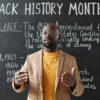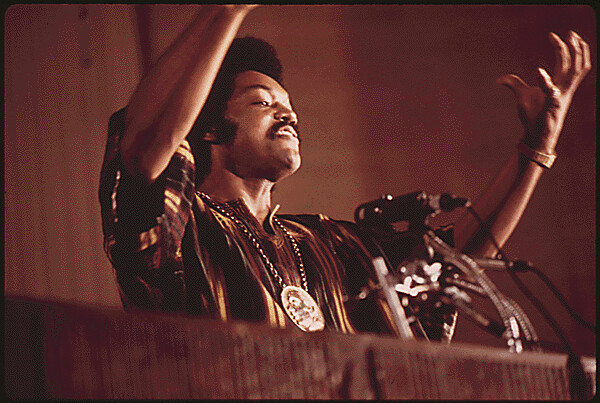-
play_arrow
WURD Radio
By Dr. James Peterson | WURD Radio
Young Black boys and men are coming of age inside an economy where attention is the currency and influence is king. Many spend six to eight hours a day navigating a digital flood of images, sounds and provocations, often with little to no formal guidance on critical media literacy. We talk about equipping them with the tools to manage this environment, but in practice, we don’t.
We are failing to teach young Black boys how the attention economy works, and even worse, we are failing to show them how higher education might be a way to survive it.
In his recent book, “Sirens Call: How Attention Became the World’s Most Endangered Resource,” journalist Chris Hayes details how media dominance—not policy, not governance—can make or break a political figure. A president can rule simply by staying in the news cycle, even if the attention he commands comes from felony charges. Black boys already understand certain aspects of this reality intuitively. They live it.
We can see the deadly consequences in the tragic story of YBC – the Young Bag Chasers, a crew of teenagers from West Philadelphia. Leveraging drill rap and viral social media content, they built massive online followings—and then destroyed each other in bloody cycles of retributive violence, filmed and celebrated for clicks. This is not a cautionary tale from afar. It is a brutal reality for too many young Black men who have been taught, however implicitly, that their value lies in how much attention they can command, no matter the cost.
Where does college fit into that narrative? Right now, it doesn’t. We are at an inflection point. Recent data from Howard University shows that only 19% of undergraduates are Black men. It is unclear how many of those young men are African American descendants of enslaved Africans.
This is part of a broader, alarming trend: Black male enrollment in college has plummeted to a 50-year low, according to data from the National Student Clearinghouse Research Center (Causey et al., 2021). Between 2011 and 2019, the number of Black men attending college dropped by over 20%, and declines at Historically Black Colleges and Universities (HBCUs) mirror this trend.
This is catastrophic because HBCUs produce nearly 40% of all Black engineers, 50% of Black lawyers, and 80% of Black judges, according to the United Negro College Fund. If Black male enrollment at HBCUs continues to fall, the presence of Black men in the Black professional class as we know it is in grave danger.
Today’s economy tells too many young Black boys they have three options to “get out”:
- Rapper
- Baller
- Influencer
Education is no longer seen as a way out because we have failed to make it look viable. Instead, the attention-driven influencer economy has added another seductive route: If you can’t dribble or spit rhymes, you can chase viral fame. The problem? The stakes are often death, incarceration or poverty.
For decades, the criminal justice system has lectured Black boys about “making better choices”—usually after they’ve already been swept into the system. It’s a moot point by then. Incarceration rates for Black men remain shockingly high: one in three Black men born today can expect to be incarcerated in their lifetime, according to data from The Sentencing Project (2021).
Meanwhile, overall education attainment remains sobering. Black women continue to outpace Black men in college graduation rates. Black students overall have a college graduation rate nearly 20 percentage points lower than their White counterparts (National Center for Education Statistics, 2023).
Black boys know this. They live it. They see it in the way teachers police them more than they teach them, in the scarcity of mentors or teachers who look like them, and in a society that invests more in their surveillance than in their education. If Black boys are to survive and thrive in the 21st-century economy, we must give them better tools. We must teach them that attention isn’t just to be captured; it is to be managed. Influence is not just about likes—it is about leadership.
Imagine if we showed young Black boys how to use influence to change their schools, their blocks, their cities—not just their social media feeds. Imagine if “influencer” meant community organizer, entrepreneur or advocate, not just an Instagram celebrity.
The old slogan that “Black men are an endangered species” used to stir a sense of urgency. But slogans are not enough anymore. Black boys are endangered precisely because we have surrendered their futures to an attention-driven, influencer-aspiring economy that rewards destruction more than creation.
The urgency must now shift to building real infrastructure—curricula that teach media literacy, mentorship networks that model leadership, and policy reforms that make college affordable and attainable.
Otherwise, we will keep losing generations of Black boys not just to prisons, but to the empty promises of a culture that trades their genius for entertainment value. It is not enough to tell Black boys to “make better choices.” We must offer better options.
We must teach them to pay attention to the economy, to their communities and, most importantly, to themselves. Before it’s too late.
THE WURD WEEKLY NEWSLETTER
Black Talk Media sent straight to your inbox.
SUPPORT WURD
Supporting WURD Radio is your way to
protect and preserve Independent Black Media.
Written by: James Peterson
Black men college Dr. James Peterson education graduation HBCUs Historically Black Colleges and Universities Incarceration onWURD pennsylvania philadelphia philly wurd radio YBC Young Bag Chasers
Featured post
Latest posts

This Week on WURD: Schools, Art, Olympics & Joe Frazier

When justice had a megaphone: The Rev. Jesse Jackson’s life in full voice

I Am Jesse Jackson – Dr. James Peterson

This Week on WURD: State budgets, missing persons, global representation & systemic justice

In an era of media suppression, Black history reminds us why we must protect the truth
Current show
Upcoming shows

Solutions On WURD
5:00 pm - 7:00 pm

The Envy McKee Show
7:00 pm - 10:00 pm

Freedom Sounds of Jazz
10:00 pm - 12:00 am

WURD Programming
12:00 am - 6:00 am

Conversations with the Commissioners
8:00 am - 9:00 am
WURD Radio LLC © 2012-2021. All rights reserved.






